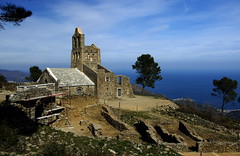My dad told me that trees have roots that go down as far as the tree is tall. That was an impressive statement and it stuck with me for a long time.
It was, of course, untrue.
He didn’t know much about trees. He was, by his own admission, a “city boy”.
I don’t blame him; lots of people think tree roots go deep.
They don’t.
Any photo of a knocked down tree makes it clear.
See? Roots go out not down.
(The mistake about roots becomes pointedly obvious.)

Tree roots reach out, not down.
Roots aren’t so much much like anchors hold the tree to the ground, but rather more like feet planted in the soil, in all directions, to create stability and nourishment. They can extend nearly as long as a tree is tall.
The California Redwoods seem even more impressive now, don’t they?
Forests are interconnected places where trees stretch out their roots and touch the other trees nearby, below the surface.
A web of root holds a forrest together as if the trees are playing a long game of forest footsie.
The takeaway:
Like the myth of tree roots, the roots of community don’t go down either–in ideal circumstances. Instead, they go out, or the forest dies.
On Sunday, I’ll go back to church for the first time in 2 months. My work schedule has kept me away, but I’m happy to go back and remember everything I need to remember all over again:
• Who I am in God, in community, and in the scope of human history and the Church worldwide and over the course of eons.
Maybe I’ll learn something new about me, or about church (God’s people), or about what sacred ritual does for me.
I haven’t been separated from this weekly occurrence (for this long) in over 20 years. I’m wondering what it’ll be like to go back. (The next post -or a short series- will get into that.)
My thoughts are forming like questions:
• Will I sense the roots of others stretching out to meet me?
• Will my absence have been noticed at all?
(If a tree falls in a forest…er, um, never mind.)
• Will everything be the same or nothing, or will I be the only one who has changed?
• Will I realize how much I’ve missed it, or be surprised that it hasn’t mattered like I thought it would or should?
• Am I really part of a forest, or am I more like a lone tree on a hill?
Whatever happens, I want to be the tree that stretches out into the stream, into the living water, for nourishment and life.

Jeremiah17:7-8
“Blessed is the [one] who trusts in the LORD And whose trust is the LORD. “For [s]he will be like a tree planted by the water, That extends its roots by a stream And will not fear when the heat comes; But its leaves will be green, And it will not be anxious in a year of drought Nor cease to yield fruit.



